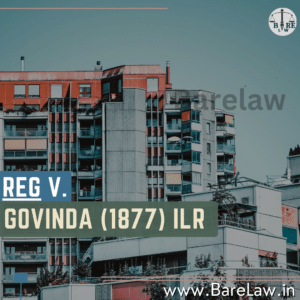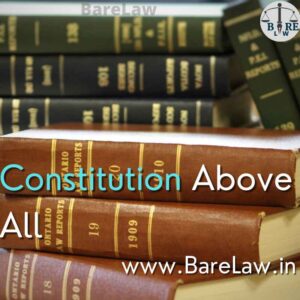Simplifying Your Life & Law | Legal Drafting services
Case Name- I.R. Coelho v State of Tamil Nadu
Citations- [(2007) 2 SCC 1: AIR 2007 SC 861.]
FACTS OF THE CASE
After the Constitution was instituted, a few agrarian and land reforms legislation were passed. These were tested in State High Courts on the ground of infringement of fundamental rights. The Patna High Court struck down certain land reforms legislation as being violative of fundamental rights. Comparative legislation was maintained by the Allahabad and Nagpur High Courts and appeals from these decisions were forthcoming in the Supreme Court. The Union Government, with the end goal of stopping this case, passed in Parliament the Constitution [First Amendment] Act, 1951. By this amendment Article 31-B and Ninth Schedule were instituted in the Constitution. The goal and impact were that any legislation set in the Ninth Schedule couldn’t be tested on the ground that it was violative of any fundamental right. It is fascinating to take note of that solitary thirteen Acts, all managing agrarian reforms, were at first positioned in the Ninth Schedule. In course of time, that number expanded to 284. A large number of the Acts, which had no connection with agrarian or financial reforms, were unpredictably positioned in the Ninth Schedule.
The case emerged on account of the Gudalur Janmam Estates (Abolition and Conversion into Ryotwari) Act, 1969 (the Janmam Act). This act vested lands of forests in the Jamnam homes in Tamil Nadu. It was stuck by the court since it didn’t represent agrarian change which could be ensured by article 31-A of the Constitution. The dispute asked before the Constitution Bench was that the resolutions, which had been recently struck down, couldn’t be a piece of the Ninth Schedule.
ISSUES RAISED
- Whether the ninth Schedule is excluded from judicial scrutiny?
- Whether the fundamental rights whenever discovered violative, in the ninth schedule likewise be tested under the watchful eye of the courts?
- Whether the basic structure test would remember a judicial review of Ninth Schedule laws for the standard of fundamental rights?
- To what degree and nature of insusceptibility can Article 31-B truly give?
CONTENTIONS BY PETITIONER
The petitioners contended that the Ninth Schedule laws can’t be consulted with constitutional resistance of the sort given by Article 31-B and if such invulnerability is given it ought to be declared by the immediate effect and impact test. It implies that the type of the amendment would not be applicable, yet the result would play a determinative factor.
It was presented that the ability to make any law at its will infringes Part III and isn’t in arrangement with the basic structure of the Constitution. The result of such discretionary will whenever permitted would annul Article 32 and be violative of the basic structure of the Constitution.
It was additionally presented that the Constituent force under Article 368 isn’t comprehensive of judicial force. The ability to build up judicial cures is subjectively not the same as the ability to practice judicial force.
CONTENTIONS BY RESPONDENT
The respondents contended that the Validity of Ninth Schedule legislations must be tried on the standard of basic structure doctrine as chosen by the larger part in Kesavananda Bharati’s case. As the case had maintained the 29th Amendment it was presented that there couldn’t be any inquiry of judicial review on the ground of infringement of fundamental rights.
It was presented that Fundamental Rights are avoided by the assurance given by Article 31-B. Subsequently, the test can be founded distinctly on the basic structure doctrine.
Further, it was presented that however the presence of legal executive is a basic structure of constitution and can’t be revoked this force could be curtailed in a specific issue. It was also presented that Article 31B and the amendments made by such laws added to the Ninth Schedule structure such a gadget, which would ‘fix the deformity’ of legislation.
RATIO DECIDENDI
The intention behind Article 31B is to eliminate challenges and not to annihilate part III. The doctrine of basic structure is propounded to save the basic characteristics. Prohibition of fundamental rights would bring about invalidation of the basic structure doctrine, the object of which is to ensure basic highlights of the Constitution. Along with these lines inclusion of laws and guidelines in the ninth Schedule notwithstanding being admissible, won’t make any such laws or guidelines insusceptible from the legal audit.
OBITER DICTA
Constitutional Amendments are additionally dependent upon certain limitations. Also, such limitations can’t be left to be chosen by parliament. Parliament makes laws and announcing such laws legitimate it by embeddings such laws in the Ninth Schedule is a reasonable infringement of the doctrine of governing rules. However, Article 68 incorporates the words constituent force of Parliament. Such Amending powers don’t put parliament comparable to Constituent Assembly. Parliament stays a body constrained by the constitution. The limitations of the basic structure doctrine would in any case apply to parliament.
JUDGEMENT
The court held that the constitutional legitimacy of the ninth schedule laws could be pronounced by applying the immediate effect and impact test, i.e., rights test, which necessitates that it isn’t the type of law, however, its impact, that would be the determinative factor. It is the court that is to choose if this obstruction is advocated and if does or doesn’t add up to an infringement of the basic structure.
As expressed, the duty of the court is “assurance by the court whether the intrusion was important and provided that this is true how much”. This position then, at that point serves to move the assurance of the requirement for the law from the Parliament to the courts for choice.
It likewise permits the courts the adaptability of both the rights test and the substance of rights test in managing the legitimacy of such cases. The assurance of the impact of the infringement, regardless, would be for the courts to decide.
The Court in this matter enumerated that it was the job of the Judiciary to secure the fundamental rights of the residents. The expansion of the term ‘constituent force’ in Article 368 doesn’t empower the Parliament to turn into the first Constituent gathering. Even after the consideration of the term ‘constituent force’ in Article 368, the limitations of the basic structure of doctrine would, in any case, apply to the Parliament. Any amendment that is inconsistent with the basic structure doctrine which changes the personality of the Constitution or alters the essential components which frame the center of the Constitution would be disposed of.
The court in its judgment by a unanimous decision held that any law remembered for the ninth Schedule which compresses the rights presented in Part III of the Constitution would be discredited by the activity of judicial review. The ‘impact and effect’ test should be thought of while deciding if such a law annihilates the Basic structure Doctrine.
All amendments to the Constitution made on or after 24th April 1973 by which the Ninth Schedule is altered should be tried on the standard of the basic highlights of the Constitution as reflected in Article 21, Article 14, and Article 19. Any law held to be violative of any rights in Part III which is included in the Ninth Schedule after 24th April 1973, can be tested on the ground that it annihilates the basic structure as demonstrated in Article 21, Article14 and Article 19 and other standards. Judicial review is a basic structure of the Constitution, and no law can be immunized from judicial review via including the ninth Schedule.
CASE COMMENT
The judgment in I.R. Coelho enthusiastically reaffirms the doctrine of basic structure. For sure it has gone further and held that a constitutional amendment involves an infringement of any fundamental rights which the Court sees as shaping piece of the basic structure of the Constitution then the equivalent can be struck down contingent on its effect and results.
Soli Sorabjee, the previous Attorney General of India in a Lecture in the Oslo University in October 2008, brought up that “The judgment forces further limitations on the constituent force of Parliament as for the standards basic certain fundamental rights. With the most extreme regard, the judgment isn’t helpful for clearness. It has presented indistinct ideas like the quintessence of the rights test. Other than being separated from the express terms of Articles 21, 14, and 19, what are the standards hidden thereunder? One doesn’t need to be a prophet to picture further prosecution to clarify the Coelho judgment which makes certain to add to the predominant disarray.” Thus, there is no sureness of unanimity about what comprises the fundamental or basic highlights of the Constitution.
You may also like to read:
-
29 Jul 2021 Case BriefsCase Brief on Virsa Singh v. The State of Punjab (1958) AIR 465
-
03 Jul 2021 Case BriefsSakshi vs Union of India
-
25 Aug 2021 Case BriefsCase brief of K. M. Nanavati v. the State of Maharashtra
-
04 Sep 2021 Case BriefsCase Brief: Reg v. Govinda (1877) ILR Bom 342
-
10 Jul 2021 Know Your LawCulpable Homicide and Murder
-
12 Sep 2021 Know Your LawConstitution above all





